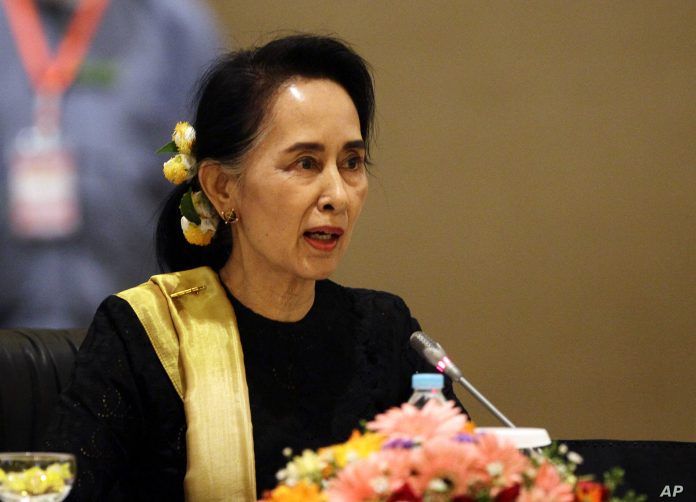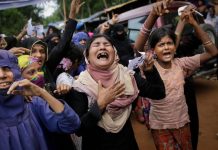This article is written by Ishan Arun Mudbidri, from Marathwada Mitra Mandal’s Shankarrao Chavan Law College, Pune. This article talks about the ongoing military coup in Myanmar, followed by the arrest of Aung San Suu Kyi.
Table of Contents
Introduction
Myanmar as a country has struggled to attain peace ever since it gained independence in the 40s. From the humanitarian crisis of the Rohingya Muslims to the long-lasting military rule, the citizens have seen and continue to see dark times. Amidst all this, the country’s leading light, Aung San Suu Kyi has been recently arrested and detained by the military.
How Burma became Myanmar
Currently, as we speak, the military commander-in-chief Ming Aung Hlaing has taken charge of the country. However, it is important to understand the history of the South East Asian Nation. Burma, as it was popularly known before its independence, was a British colony during the British rule in India. The Second World War led to the separation of Burma from the hands of the British in 1948. Soon after its independence, in 1962 the military took control of the country under the leadership of General U Ne Win. Later Burma was renamed the Republic of Myanmar in 1989 despite being ruled by the military.
Myanmar/Burma military coup : coup d’etat
A military coup, also known as coup d’etat in French, is the overpowering of a small mob or the country’s military on the political leadership. A coup is different from a revolution because a revolution is generally done by a large number of people and affects the overall economic, social, cultural, and political scenario of the country whereas, a coup is done to take control of the government and rarely affects economic and other ties of the country. Some coups end up toppling down the dictatorship and some end up becoming dictators. An example of a good coup was the 2010 Niger military coup which overpowered the then President Mamadou Tandja and imposed democratization. However, the Myanmar military rule did not prove to be a good coup. After 1989, the military junta (government led by the military establishment) took over and in 2008, formed their Constitution which gave widespread powers to the military under civilian rule. In 2011, the junta dissolved and a transitional government was put in place. The then Prime Minister Thein Sein was appointed as the President. Between 2011 to 2015, there was a steady rise in the overall development of the country. The economy also started gaining momentum. In 2015, the country witnessed its first nationwide elections and the National League for Democracy party led by Aung San Suu Kyi emerged victorious.
What is happening in Myanmar: Aung San Suu Kyi’s conviction
A born leader
Aung San Suu Kyi took charge of Myanmar in 2015 after almost 25 years of fighting for her motherland. She is the daughter of Myanmar’s freedom struggle hero Aung San who was assassinated just before Myanmar attained independence in 1948. Aung San Suu Kyi’s fight for freedom started in 1988 where the people of Myanmar had started gathering courage against the oppressive rule of General U Ne Win. During this time, Myanmar was at its lowest. Corruption was at a rapid pace, the economy was down, the leadership started separating the country from the rest of the world, and incidents of violence against the people started increasing. Someone had to stand up against this intolerance and it was the youth who did so. Many were killed from the lethal use of force by the military, some of them had to spend around two decades in prison. However, this event in 1988 led to the resignation of General U Ne Win, and the students who led the resistance have a special status in Myanmar even today. Aung San Suu Kyi became the leader during these protests and formed her own opposition party, National League for Democracy. In 1990, her party had won the national elections but she wasn’t allowed to take charge of the political establishment by the military. Thereafter, she had to spend around two decades in detention and house arrest. When she returned in 2010, she re-joined politics and in 2015, her party won the elections again. This time it was the Constitution of Myanmar that disallowed her from becoming President because her children were supposedly foreign nationals. Hence, she became the de-facto leader of the country.
Rohingya crisis
Perhaps the most talked-about topic after the military junta is the Rohingya crisis in Myanmar. The Rohingyas, a minority ethnic community from North Myanmar were framed as illegal immigrants right after Myanmar gained independence in 1948. This was due to their religious differences with the country’s Buddhist population. In 1982 again, they were seen as illegal immigrants from Bangladesh. Under General U Ne Win’s rule, the community was persecuted and abandoned from the rest of the country.
After nearly 25 years in 2016, hundreds and thousands of Rohingya Muslims were seen fleeing the country and going to Bangladesh. This was because they were attacked by mobs unknown. Some say they were Rohingya Aarsa militants, some say it was the Rakhine Buddhist mobs. A large number of Rohingya were killed in these attacks. The others, however, started fleeing from the country. Aung San Suu Kyi had won the Nobel Peace Prize in the 90s when the Rohingya were banned as illegal immigrants. Often praised as a Human Rights leader, Ms. Suu Kyi gave her Nobel Prize speech when the Rohingya saw its darkest times. Today she faces allegations of staying quiet and not raising her voice against such a grave situation. In her recent interview with the BBC network, Ms. Suu Kyi stated that the Buddhists in the country have suffered equally and the term ‘ethnic cleansing’ is too strong to describe the Rohingya issue. World leaders across the globe have criticized Aung San Suu Kyi’s stand on the issue and have been mounting pressure on her ever since.
The 2021 military coup
In 2020, Myanmar held its second nationwide election. Just like in 2015, Aung San Suu Kyi’s NLD party won with a convincing margin. However, many in the country alleged the voting system to be rigged. The military junta also suffered a huge blow. Due to this, the military staged a coup and regained control in February. Newly-elected leader Aung San Suu Kyi was detained and a military-ruled court held her guilty on multiple charges like corruption, violations of telecom laws, etc. which she denied. She was sentenced to 4 years in prison but was later reduced due to a partial pardon by General Min Aung Hlaing. Several other leaders including current President Win Myint were also sentenced to a 4-year jail term. Nationwide protests resumed, which proved to be larger than the infamous Saffron Revolution in 2007 wherein monks came out in huge numbers to protest against the unrest. The noticeable feature in the 2021 protests was the three-finger salute. This became a symbol of resistance and unity against the coup. The same gesture was seen in the Hunger Games movie. It was the doctors who started the protests, followed by the other citizens. The motives behind the 2021 coup remain largely unclear with the military assuming power for one year as mentioned in the Constitution.
Who is General Min Aung Hlaing
Min Aung Hlaing became the commander-in-chief of the Myanmar military which is also known as the Tatmadaw. A former law student, the general has always been an important name in the Myanmar army. In 2015, when Aung San Suu Kyi came to power, he ensured that the military shall have around 25% share in the parliamentary seats. During the Rohingya genocide in 2016-17, the international community condemned the acts of Chief Aung Hlaing and other senior military personnel. The US also imposed sanctions on him in 2019. Despite all this, he has regained control over Myanmar.
Reaction to the Myanmar crisis
The Myanmar military has declared a one-year state emergency in the country. Countries across the globe have condemned the military coup and also the Rohingya issue. The United Nations General Assembly has formally condemned the military coup. US President Joe Biden has urged for full support to impose democratization in Myanmar and punish those responsible for the coup. The UN Security Council released a statement calling for the immediate release of detained officials Aung San Suu Kyi and others.
The Indian scenario
Amidst heavy international pressure on the Myanmar political leadership, India has not yet condemned the February military coup. This is because of certain strategic consequences. During the protests, a large number of people from Myanmar have entered the country through Mizoram and Manipur. These people also include various police and military personnel. This poses a huge challenge for India who has a stable relationship with Myanmar’s military. Further, the Indo-Myanmar Thailand Trilateral Highway, which will provide connectivity from Manipur to Myanmar and then finally to Tak province Thailand, may be put on hold due to the political instability and unrest. On the whole, New Delhi’s reaction to the Myanmar crisis despite expressing serious concerns has been mild.
Conclusion
Myanmar is burning. There seems to be no other option but to wait and watch what happens after the one-year tenure of the military gets completed. The COVID-19 pandemic makes it even more difficult to think about a combined international solution to this issue. Aung San Suu Kyi continues to remain in jail and the Rohingya are still suffering.
References
- https://www.cfr.org/backgrounder/myanmar-history-coup-military-rule-ethnic-conflict-rohingya#chapter-title-0-5
- https://www.moneycontrol.com/news/world/in-depth-what-led-to-myanmars-military-coup-and-how-india-feels-the-heat-6697291.html
- https://www.theguardian.com/world/2021/dec/06/aung-san-suu-kyi-sentenced-to-four-years-in-prison-for-incitement
- https://www.bbc.com/news/world-asia-55902070
- https://www.idsa.in/idsacomments/post-coup-myanmar-indias-response-ubsingh-210521
- https://www.unicef.org/emergencies/rohingya-crisis
LawSikho has created a telegram group for exchanging legal knowledge, referrals, and various opportunities. You can click on this link and join:
https://t.me/joinchat/L9vr7LmS9pJjYTQ9
Follow us on Instagram and subscribe to our YouTube channel for more amazing legal content.
 Serato DJ Crack 2025Serato DJ PRO Crack
Serato DJ Crack 2025Serato DJ PRO Crack










 Allow notifications
Allow notifications


